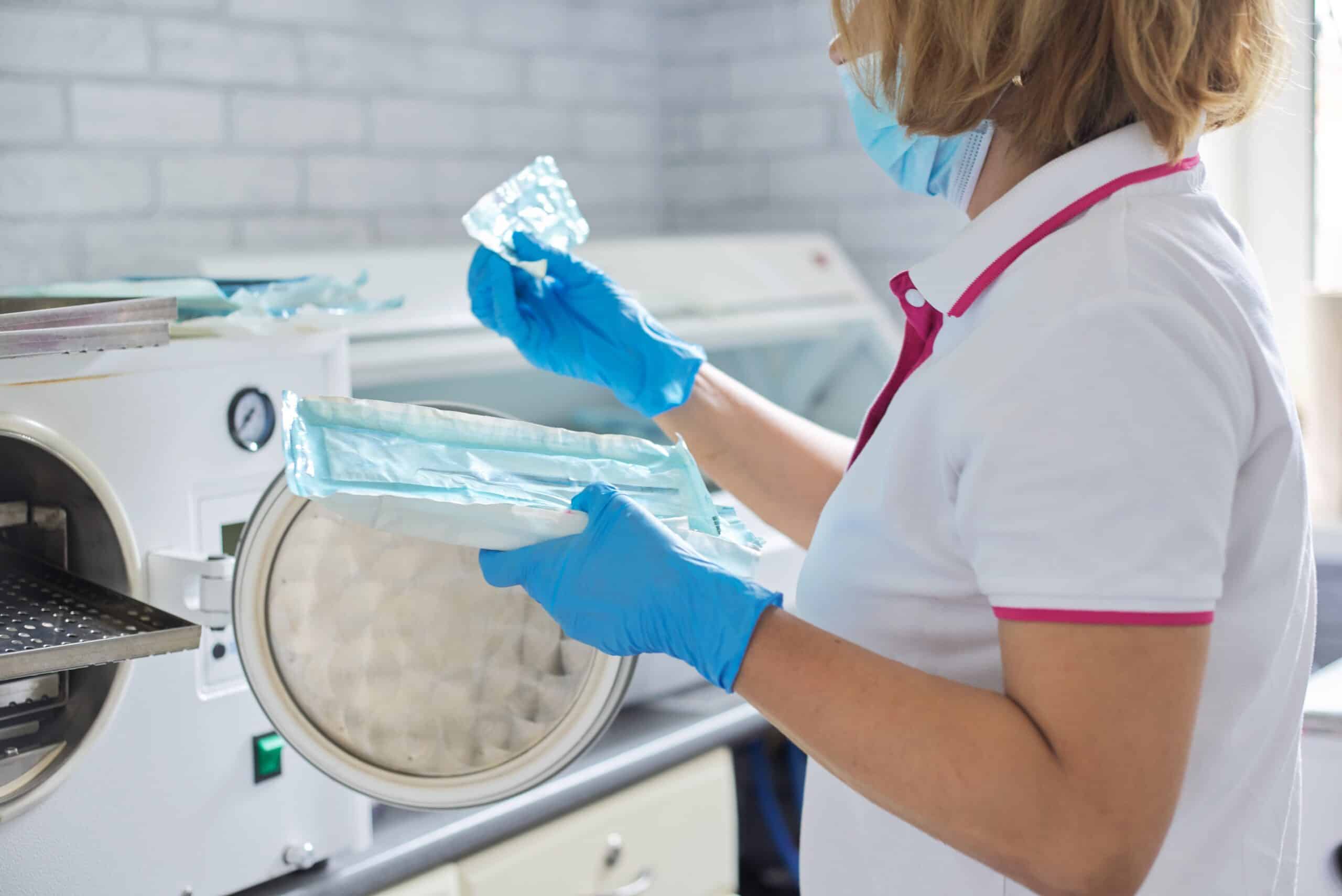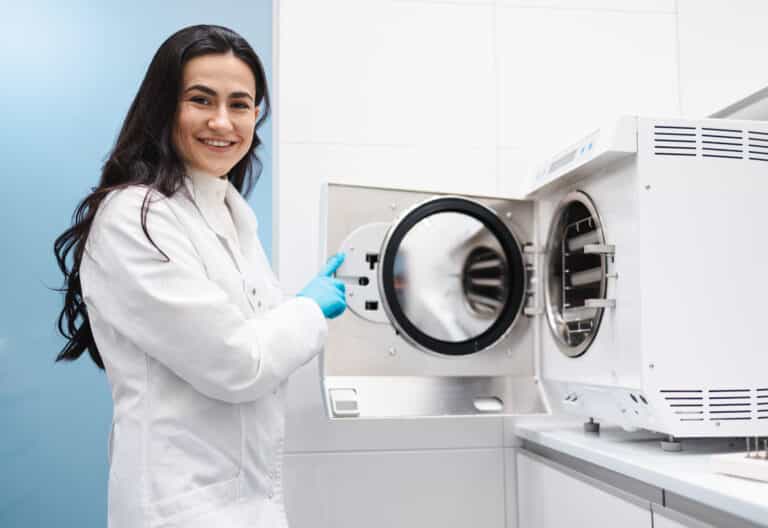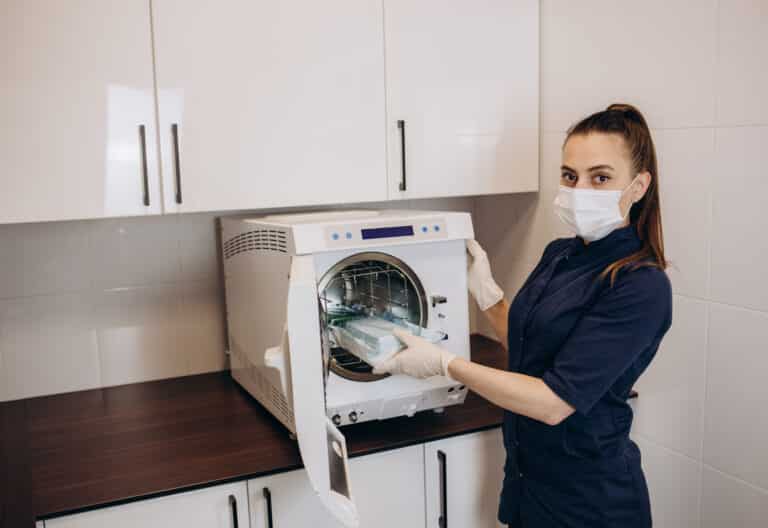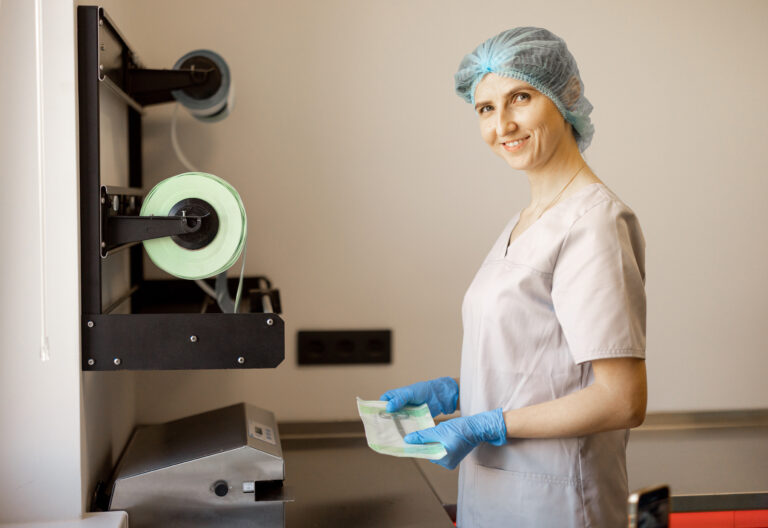Are you someone who aspires to become a Sterile Processing Technician but hates the idea of being stationed in one place?
Well, no worries, because there’s a role within this career and it’s called the Travel Sterile Processing Technician.
In this article, we’ll delve into what a travel sterile processing technician is, their duties, necessary skills, salary expectations, job outlook, pros and cons, differences from traditional Sterile Processing Technician roles, and how you can start this career.
Plus, we’ll also share with you a special approach that makes you job-ready as a Sterile Processing Technician faster in less than 4 months.
So, let’s get started!
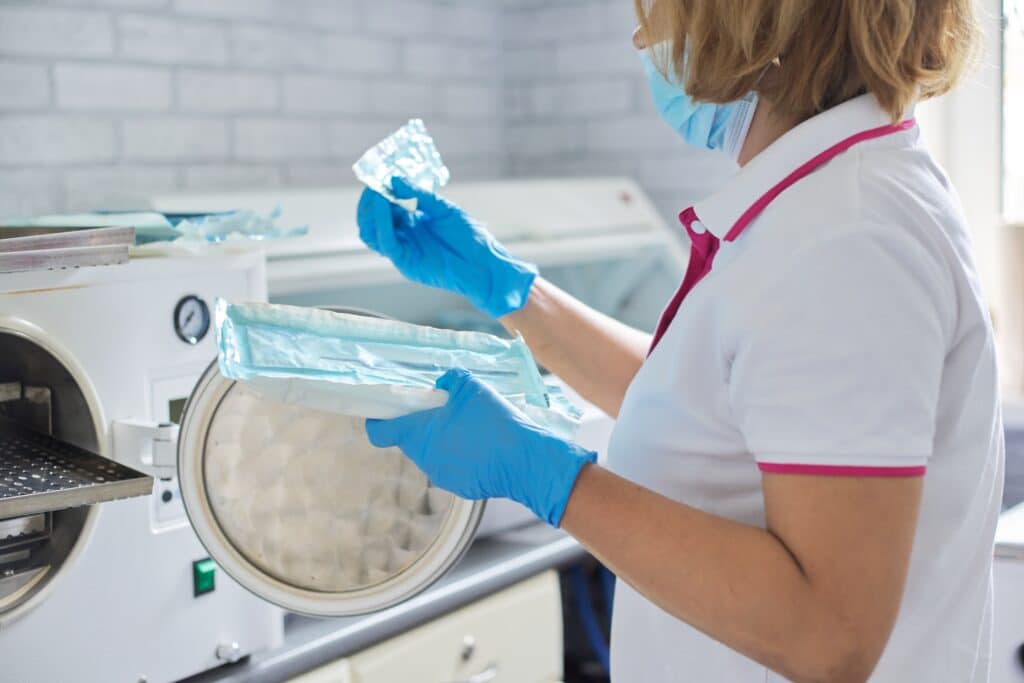
What is a Travel Sterile Processing Technician?
A Travel Sterile Processing Technician is a healthcare professional who specializes in the cleaning, sterilization, and preparation of surgical instruments and medical equipment.
Unlike traditional Sterile Processing Technicians who work in a single facility, travel Sterile Processing Technicians take short-term assignments in various healthcare settings across different locations.
These assignments can range from a few weeks to several months, providing the flexibility to work in diverse environments and gain a broad spectrum of experience.
They are very crucial in the healthcare industry, preventing infections and ensuring proper functioning by assisting healthcare facilities that are short-staffed, experiencing high workloads, or undergoing staff training.
Read:
-> What is a Sterile Processing Technician?
-> What Does a Sterile Processing Technician Do?
What does a Travel Sterile Processing Technician do?
A career as a Travel Sterile Processing Technician offers the unique opportunity to explore new healthcare facilities while ensuring they meet the highest cleanliness and safety standards.
But their duties are the same as those of the traditional Sterile Processing Technicians:
- They meticulously clean and decontaminate surgical instruments and equipment, removing any organic and inorganic residues.
- They operate specialized equipment such as autoclaves to sterilize instruments, ensuring the elimination of harmful microorganisms.
- They assemble and package sterile instrument sets according to specific procedures, ensuring they are ready for use in medical procedures.
- They manage inventory levels of sterile supplies, ensuring healthcare providers have the necessary tools and equipment.
- They participate in quality assurance activities, such as monitoring sterilization processes and conducting equipment maintenance checks.
- They work closely with other healthcare professionals to ensure the timely delivery of sterile instruments and address any issues related to sterile processing.
Skills Needed for this Job
To become a Traveling Sterile Processing Technician it requires some core skills. Skills such as:
Sterilization Techniques
They must be proficient in sterilization methods, including knowledge of different equipment, procedures, and standards for cleaning, disinfecting, and sterilizing medical instruments and equipment.
Attention to Detail
They need precise attention to detail to ensure instruments are properly cleaned, assembled, and sterilized according to protocols and standards to prevent infections.
Technical Aptitude
They should have the ability to operate and troubleshoot sterilization equipment and machinery commonly used in healthcare settings.
Physical Stamina
They must have the physical stamina to handle the demands of the job, including lifting and moving heavy equipment.
Adaptability
They should be able to adapt to different cities, facilities, and people, adjusting to new environments quickly.
They also need to adapt quickly to different healthcare equipment, and procedures when moving between facilities.
Willingness to Travel
They need a willingness to travel frequently and work in diverse healthcare settings, embracing the lifestyle of a traveling professional.
Communication Skills
They must communicate clearly with healthcare staff to understand their needs and ensure proper handling of instruments.
Teamwork
They should collaborate effectively with other healthcare professionals, including surgical teams and central service staff, to ensure efficient and safe instrument processing.
Problem-Solving
They need the ability to troubleshoot equipment issues, understand sterilization challenges, and find solutions in various settings.
Compliance and Regulations
They should know industry regulations, standards, and best practices in sterilization procedures to ensure compliance with healthcare guidelines and protocols.
So, these are some key skills you should incorporate if you want to become a successful traveling sterile processing technician.
Read:
-> Sterile Processing Technician Requirements
-> How to Become a Sterile Processing Technician?
How much does a Travel Sterile Processing Technician make?
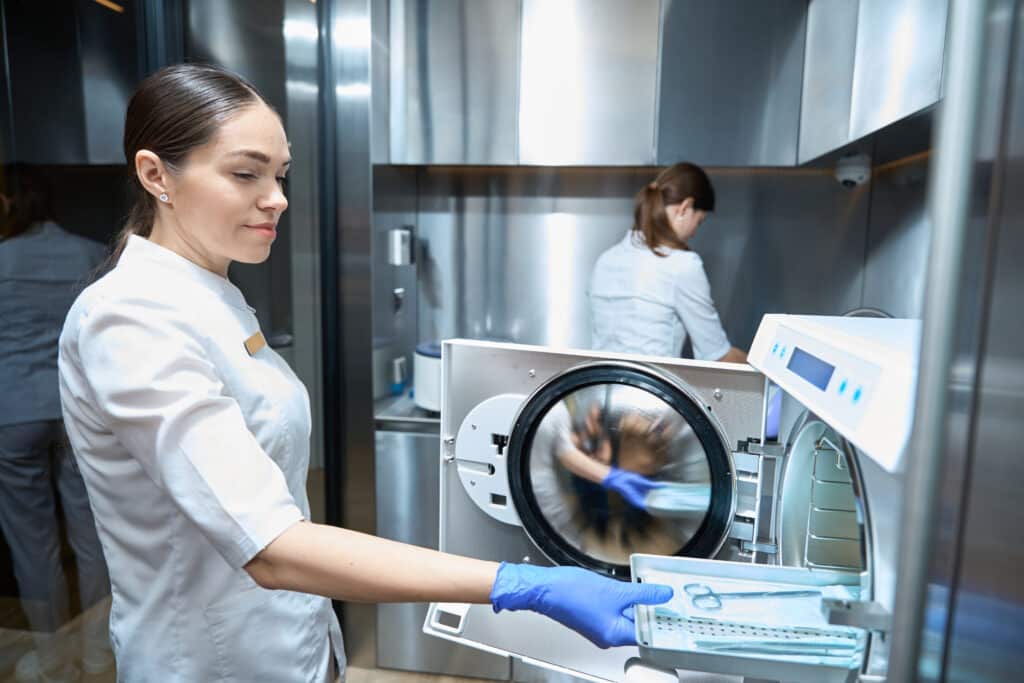
Travel Sterile Processing Technicians are often compensated well due to the demand for their specialized skills and the flexibility required for their roles.
In the United States, travel Sterile Processing Technicians on average make around $1,560 per week.
Let’s break this down further –
They could earn an hourly wage of between $25 to $40, depending on your expertise, experience, and job location.
If you’re an experienced Sterile Processing Technician who has opted for a travel role, you’ll earn around $39 per hour or around $81,120 per year.
This competitive salary reflects the critical nature of the job and the flexibility required for travel assignments.
N.B.– This salary data is compiled from different online sources and may differ between healthcare facilities.
Job Outlook of Sterile Processing Technicians
The job outlook for Sterile Processing Technicians, including travel Sterile Processing Technicians, is very promising.
According to the U.S. Bureau of Labor Statistics, the employment of medical equipment preparers, which includes Sterile Processing Technicians, is projected to grow 8.3% from 2020 to 2030.
This growth is driven by the increasing demand for healthcare services and the need for infection control in medical settings.
The role of Sterile Processing Technicians is critical in ensuring the safety and effectiveness of surgical procedures, making it a stable and in-demand career choice.
You May Also Like:
-> Sterile Processing Technician Salary
-> Sterile Processing Technician Resume
-> Sterile Processing Technician Job Description
Pros and Cons of Travel Sterile Processing Technician Career
Becoming a Travel Sterile Processing Technician offers unique opportunities and challenges. This career path allows professionals to work in various healthcare settings across different locations, providing a dynamic and often rewarding experience.
Pros of a Travel Sterile Processing Technician Career
Here are the pros of pursuing a career as a Travel Sterile Processing Technician –
Higher Earnings Potential
Travel Sterile Processing Technicians often earn more than their stationary counterparts due to higher demand and the additional compensation for travel-related expenses.
In the United States, travel Sterile Processing Technicians on average make around $1,560 per week, which is around $39 per hour.
In contrast, the traditional Sterile Processing Technicians earn around $47,410 per year, which is equivalent to $22.79 per hour.
This increased earning potential can be a significant draw for many professionals in the field.
Flexibility and Variety
They experience a diverse range of healthcare settings, from hospitals to outpatient clinics, across different geographic locations. This variety can keep the job interesting and prevent burnout associated with a repetitive work environment.
Professional Growth
Exposure to different practices and procedures in various facilities enhances their skills and knowledge. This experience can be invaluable for career advancement and personal development.
Networking Opportunities
Traveling allows Sterile Processing Technicians to build a broad professional network, meeting new colleagues and making connections that can lead to future job opportunities and professional support.
Adventure and Travel
For those who love to travel, this career provides the perfect blend of work and adventure. They get to explore new cities, experience different cultures, and enjoy the perks of traveling while earning a living.
Job Security
The demand for skilled sterile processing technicians is consistently high, ensuring job stability. Travel Sterile Processing Technicians are often in even greater demand, providing an additional layer of job security.
Cons of a Travel Sterile Processing Technician Career
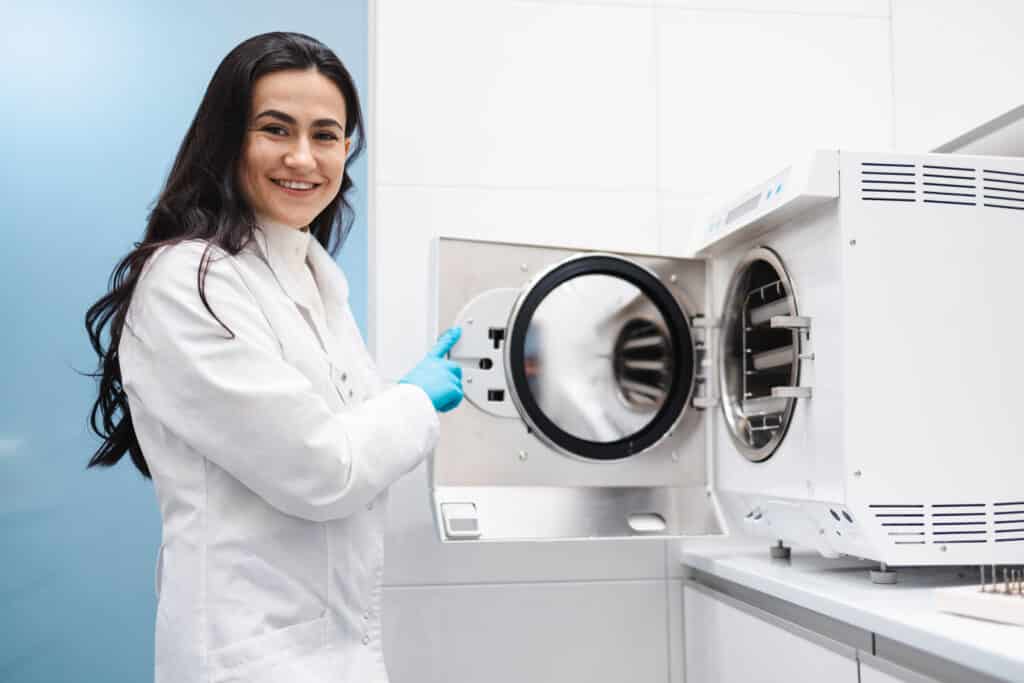
Let’s explore the cons of this career –
Frequent Relocation
Constantly moving can be physically and emotionally exhausting. Packing up and adapting to new places every few months can be challenging for many people, especially those with families or significant personal commitments.
Isolation and Loneliness
Working in new locations away from family and friends can lead to feelings of isolation. Establishing a social life can be difficult when you are constantly on the move.
Inconsistent Work Environment
They must quickly adapt to different hospital cultures, procedures, and equipment. This inconsistency can be stressful and requires a high level of adaptability and resilience.
Variable Work Schedules
Shifts and schedules may vary widely from one assignment to another, which can disrupt personal routines and make long-term planning difficult.
Healthcare and Benefits Challenges
Managing healthcare and other benefits can be more complicated for traveling professionals. They need to ensure they have continuous coverage and may face challenges when seeking medical care in new locations.
Professional Uncertainty
Despite the high demand, there can be periods of uncertainty between assignments. Securing the next contract can sometimes be stressful, leading to financial and professional instability.
Choosing a career as a Travel Sterile Processing Technician can be both exciting and challenging. The opportunity to earn a higher salary, experience diverse healthcare environments, and travel to new places comes with frequent relocations and potential feelings of isolation.
Ultimately, understanding the pros and cons can help you make an informed decision about whether this dynamic career path aligns with your professional goals and personal lifestyle.
If you find the benefits appealing and are ready to tackle the challenges, becoming a Travel Sterile Processing Technician could be a fulfilling and lucrative career choice.
Also Read:
-> Sterile Processing Technician Training
-> Sterile Processing Technician Programs
-> Sterile Processing Technician Certificate Program Online
-> Sterile Processing Technician Training Program Cost
How are Travel Sterile Processing Technicians different from traditional Sterile Processing Technicians?
Travel Sterile Processing Technicians and traditional Sterile Processing Technicians share many core responsibilities, but their career experiences and job dynamics differ significantly.
Let’s explore the key differences between these two roles across various aspects:
Job Locations and Assignments
Travel Sterile Processing Technicians work in various healthcare facilities across different cities, states, or even countries. They typically take on temporary assignments ranging from a few weeks to several months.
They move frequently between assignments, which means they must be adaptable and prepared to relocate often.
Traditional Sterile Processing Technicians are usually employed by a single healthcare facility, such as a hospital or clinic, where they work consistently over long periods.
They enjoy a stable work environment without the need to frequently relocate.
Flexibility and Variety
Travel Sterile Processing Technicians gain experience in a variety of healthcare settings, including large urban hospitals, small rural clinics, and specialized medical centers.
They often have more control over their work schedules, as they can choose assignments that fit their personal preferences and availability.
Traditional Sterile Processing Technicians work within a single healthcare system, which provides consistency but may lack the variety that travel Sterile Processing Technicians experience.
Routine Schedule: Their schedules are typically set by their employer, offering less flexibility compared to travel Sterile Processing Technicians.
Earnings and Compensation
Travel Sterile Processing Technicians often receive higher wages due to the demand for temporary workers and the additional compensation for travel-related expenses.
They may receive per diem allowances for housing, meals, and travel, as well as benefits such as healthcare coverage through the staffing agency.
Traditional Sterile Processing Technicians receive a steady salary based on the healthcare facility’s pay scale, which may be lower than what travel Sterile Processing Technicians earn.
They typically have access to comprehensive benefits provided by their employer, including health insurance, retirement plans, and paid time off.
Professional Development and Experience
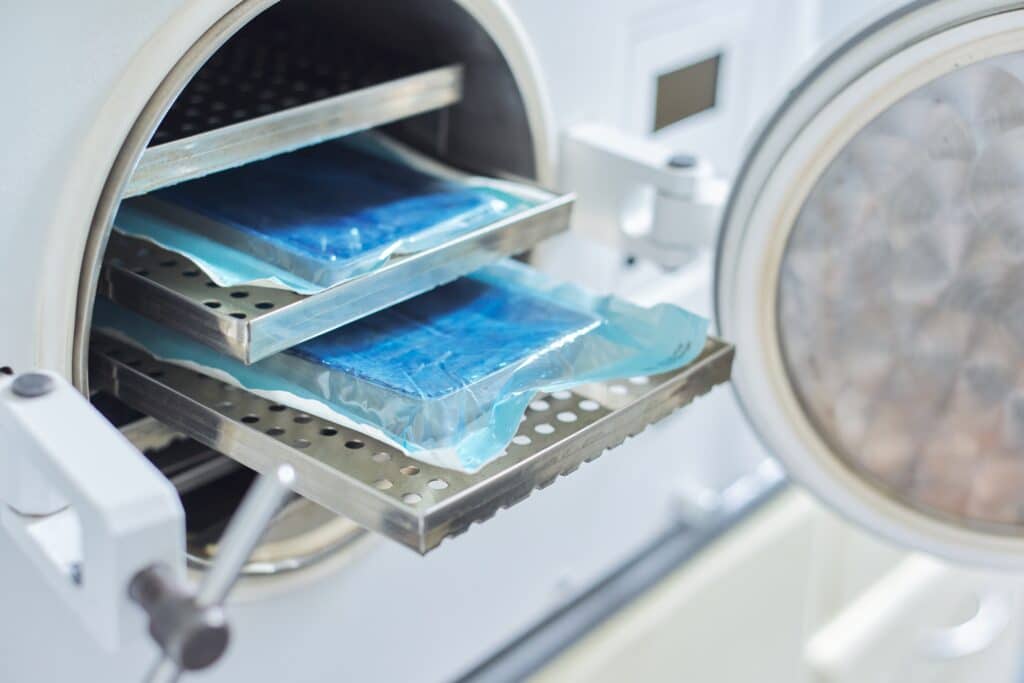
Travel Sterile Processing Technicians can gain a broad range of experiences and skills by working in different environments, which can enhance their resume and professional growth.
They meet and work with a diverse group of healthcare professionals, expanding their professional network.
Traditional Sterile Processing Technicians develop deep expertise within their specific healthcare facility and may have opportunities for advancement within the organization.
They build long-term relationships with their colleagues and patients, fostering a strong sense of community.
Job Security and Stability
While demand for travel Sterile Processing Technicians is high, the temporary nature of assignments can lead to periods of uncertainty between contracts.
They have the flexibility to take breaks between assignments, but this can also lead to gaps in employment.
Traditional Sterile Processing Technicians benefit from the stability of a permanent position, with consistent work hours and job security.
They have a continuous stream of income and steady employment benefits.
Impact on Personal Life
Travel Sterile Processing Technicians have the opportunity to travel and explore new places, which can be an exciting lifestyle for those who enjoy change and adventure.
Frequent travel can disrupt personal routines and relationships, making it challenging to maintain a work-life balance.
Traditional Sterile Processing Technicians can establish a stable personal life without the disruptions of frequent relocation.
A consistent work schedule allows for better planning and stability in personal life.
To summarize –
Choosing between a career as a Travel Sterile Processing Technician and a traditional Sterile Processing Technician depends on your personal preferences, career goals, and lifestyle needs.
Travel Sterile Processing Technicians enjoy higher earnings, flexibility, and a diverse range of experiences, but must be prepared for frequent relocations and periods of uncertainty.
Traditional Sterile Processing Technicians benefit from stability, consistent schedules, and the ability to build long-term relationships within a single healthcare facility.
Both paths offer unique rewards and challenges, making it essential to consider what aligns best with your professional aspirations and personal circumstances.
How to Become a Travel Sterile Processing Technician?
Actually, there is no specific process to become a Travel Sterile Processing Technician. You need to become a certified Sterile Processing Technician and then choose the role that requires Travel.
Here’s how you can become a Travel Sterile Processing Technician:
Obtain Necessary Education
To become a Sterile Processing Technician, you need to complete a relevant educational program. There are three primary types of educational pathways:
Certificate or Diploma Programs, Associate Degree Programs, and Online Programs.
But for a faster start, we recommend you to choose online programs. They are often the fastest route, taking as little as 6-8 months, offering flexibility and the convenience of studying from home.
Gain Practical Experience
Sterile Processing Technician is a clinical job so getting some hands-on experience is crucial in this field. Many online programs include externships or clinical placements, which allow you to gain real-world experience in a healthcare setting.
Obtain Certification
Certification is a critical step for becoming a Travel Sterile Processing Technician. The most recognized certification is the Certified Registered Central Service Technician (CRCST) offered by the Healthcare Sterile Processing Association (HSPA).
Other certifications to consider include:
- Certified Sterile Processing and Distribution Technician (CSPDT)
- Certified Endoscope Reprocessor (CER)
Also Read:
-> Certified Sterile Processing Technician
-> Sterile Processing Technician Certification
Get some Experience as a Sterile Processing Technician
You need to gain a certain amount of work experience, often for a year or two, as a Sterile Processing Technician to build experience and skills before transitioning to a travel role.
Apply for Travel Sterile Processing Technician Positions
Once certified, you can start applying for travel positions. Agencies that specialize in travel healthcare jobs often have listings for travel Sterile Processing Technician positions.
When applying, ensure your resume highlights:
- Your education
- Experience
- Certification
- Relevant skills
Secure Your First Assignment
After being hired, you’ll be matched with assignments that fit your qualifications and preferences. Travel Sterile Processing Technicians typically work on contracts that last from a few weeks to several months, providing ample opportunities to explore different parts of the country.
By following the steps outlined above, you can start this rewarding career quickly and efficiently.
For a faster start to your career use the Preppy Approach
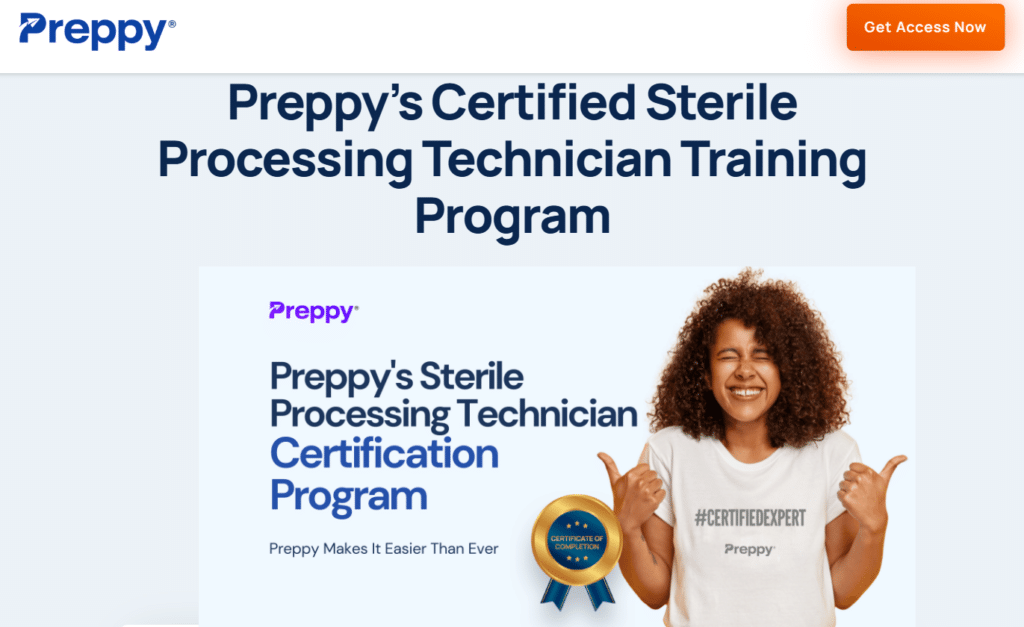
If you’re looking to start your career faster, Preppy’s Sterile Processing Technician Certification training program is a game-changer.
Here’s why:
100% Online and Self-Paced: Complete your training from the comfort of your home, on your own schedule.
University Certificate: Earn a certificate from a reputable, non-profit, 150-year-old accredited University upon completion.
Get Ready for Certifications: Thorough training to help you prepare for the CRCST certification exam.
Externship Opportunity: Helps you with an externship opportunity at a local healthcare facility, ensuring you gain the necessary hands-on experience.
Quick Completion Time: Finish the program in as little as 120 days.
Affordable: All-inclusive cost of just $1599.
Bonus Perks: Receive a free laptop to aid your studies, which is yours to keep even after you get done with the course.
So, if you’re looking to start your Sterile Processing Technician career faster without traveling to college or without the burden of student loan debt, then enroll in Preppy’s Sterile Processing Technician Certification training program.
Conclusion
We hope this article could enlighten you about the Travel Sterile Processing Technicians, and everything around this career, including the differences they hold with the traditional Sterile Processing Technicians.
Just to clarify again – a Travel Sterile Processing Technician is not a different job, but a role the Sterile Processing Technicians can take up depending on their interests and goals.
In the end, if you want to become job-ready as a Sterile Processing Technician, then you should enroll in Preppy’s Sterile Processing Technician program and start your career faster.
Click here to know more.
RELATED:
-> Sterile Processing Technician Exam
-> Sterile Processing Technician vs. Surgical Technologist
-> How Long Does it Take to Become a Sterile Processing Technician?
